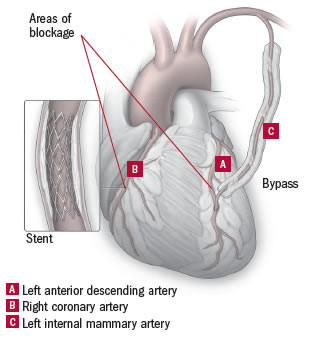
How — and why — to fit more fiber and fermented food into your meals

UTI in older women: Why postmenopausal women are susceptible to urinary tract infection, and what to do about it

Can a routine vaccine prevent dementia?

Some adults may need a measles booster shot. Who should get one and why?

Less butter, more plant oils, longer life?

Healthier planet, healthier people

Counting steps is good — is combining steps and heart rate better?

Appendix pain: Could it be appendicitis?

Can saw palmetto treat an enlarged prostate?

How does Ozempic work? Understanding GLP-1s for diabetes, weight loss, and beyond
Heart Failure Archive
Articles
Bypass plus angioplasty: The best of both worlds?
In hybrid heart surgery, the blocked or narrowed left anterior descending artery is bypassed with the nearby left mammary artery, while another blocked artery (in this case, the right coronary artery) is opened with angioplasty plus a stent. Illustration by Scott Leighton |
Known as hybrid coronary revascularization, this technique may become more widely available in the future.
The future of heart rhythm monitoring?
Small, wireless skin patches may offer a convenient way to diagnose—or rule out—arrhythmias.
An abnormal heart rhythm—when your heartbeat is too slow, too fast, or irregular—may be a fleeting, harmless event. But it might be a sign of a more serious heart condition. If you have frequent palpitations (which feel like your heart is pounding, racing, or fluttering) or unexplained fainting spells, your doctor may recommend a Holter monitor. This portable electrocardiogram (ECG) machine records your heart rhythm over a day or two.
Ask the doctor: Pacemakers and MRI scans
Q. I have a pacemaker and was told to never have an MRI scan. Is there any way around that?
A. In the past, people with pacemakers were told never to have magnetic resonance imaging (MRI), but in certain cases it may be safe.
Treating mild high blood pressure reduces heart problems
A recent study in Annals of Internal Medicine suggests that people with mild high blood pressure and no symptoms of heart disease can still benefit from taking blood pressure medication.
When your blood pressure tips above 140/90 mm Hg, most doctors suggest medication—in addition to healthy diet and exercise. The higher your blood pressure, the greater the risk of heart attacks, strokes, and death. What experts disagree on is how low you should shoot for once your blood pressure is clearly above the 140/90 threshold.

How — and why — to fit more fiber and fermented food into your meals

UTI in older women: Why postmenopausal women are susceptible to urinary tract infection, and what to do about it

Can a routine vaccine prevent dementia?

Some adults may need a measles booster shot. Who should get one and why?

Less butter, more plant oils, longer life?

Healthier planet, healthier people

Counting steps is good — is combining steps and heart rate better?

Appendix pain: Could it be appendicitis?

Can saw palmetto treat an enlarged prostate?

How does Ozempic work? Understanding GLP-1s for diabetes, weight loss, and beyond
Free Healthbeat Signup
Get the latest in health news delivered to your inbox!
Sign Up





